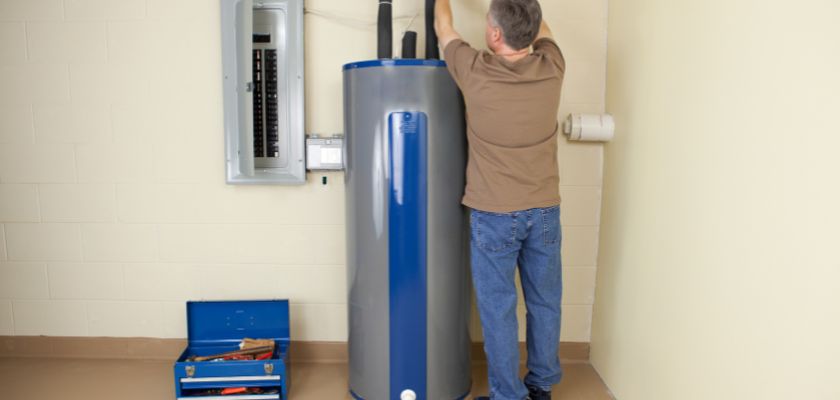Choosing the right water heater for your home is an important decision that affects both your comfort and utility bills. In this guide, we will explore the pros and cons of electric and gas water heaters, providing you with the insights needed to make an informed choice. Whether you’re considering an electric water heater installation guide or a gas water heater installation guide, this article will help you weigh the benefits and drawbacks of each type. Additionally, we’ll touch on the specific considerations for water heater installation North Richland Hills residents might need to keep in mind.
Table Of Contents
Pros and Cons of Gas and Electric Water Heaters
| Feature | Electric Water Heaters | Gas Water Heaters |
|---|---|---|
| Installation | Easy, no venting required | Complex, requires venting and gas lines |
| Operating Costs | Higher electricity rates | Lower, natural gas is cheaper |
| Heating Speed | Slower recovery rate | Faster recovery rate |
| Safety | No combustion risk, no gas leaks | Risk of gas leaks and carbon monoxide |
| Power Outages | Will not operate during outages | Can operate during outages (if no electric ignition) |
| Environmental Impact | No emissions | Emits carbon dioxide |
Understanding Electric Water Heaters

Electric water heaters are a popular choice due to their convenience and efficiency. They use electrical resistance to heat water, which is stored in a tank until needed.
Pros of Electric Water Heaters
- Easy Installation: Electric water heaters are generally easier and cheaper to install compared to gas units. They do not require venting, which simplifies the installation process.
- Energy Efficiency: These heaters are highly efficient as they convert nearly all the electrical energy into heat.
- Safety: With no combustion process, there is no risk of gas leaks or carbon monoxide emissions, making electric water heaters safer in this regard.
Cons of Electric Water Heaters
- Higher Operating Costs: Electricity is often more expensive than natural gas, leading to higher energy bills over time.
- Slower Heating: Electric water heaters typically have slower recovery rates, meaning it takes longer to reheat water after it has been depleted.
- Power Outages: In the event of a power outage, electric water heaters will not function, leaving you without hot water.
Exploring Gas Water Heaters

Gas water heaters are powered by natural gas or propane. They are known for their quick heating capabilities and lower operating costs.
Pros of Gas Water Heaters
- Lower Operating Costs: Natural gas is usually cheaper than electricity, making gas water heaters more economical to run.
- Quick Recovery Rate: Gas heaters can heat water faster than electric models, providing a continuous supply of hot water.
- Operation During Power Outages: Gas water heaters can still operate during power outages, provided they do not have an electric ignition system.
Cons of Gas Water Heaters
- Complex Installation: Installing a gas water heater can be more complex and expensive, as it requires proper venting and gas line connections.
- Safety Concerns: There is a potential risk of gas leaks and carbon monoxide poisoning if not properly maintained.
- Environmental Impact: Gas water heaters produce carbon dioxide emissions, contributing to environmental concerns.
Considerations for Water Heater Installation in North Richland Hills
When choosing between an electric or gas water heater, location-specific factors such as climate, utility rates, and local codes can influence your decision. In North Richland Hills, the mild winters may lessen the demand for hot water, potentially making electric water heaters a more viable option for some households. However, the availability of natural gas in the area may also make gas water heaters an attractive choice due to lower operating costs.
Local Utility Rates and Rebates
North Richland Hills residents should consider local utility rates and potential rebates when selecting a water heater. Some utility companies offer rebates for energy-efficient models, which can help offset the initial installation costs.
Installation Requirements
Before proceeding with a water heater installation, it’s crucial to consult a water heater installation North Richland Hills professional. They can ensure the unit is installed according to local building codes and safety standards, whether you’re following an electric water heater installation guide or a gas water heater installation guide.
Maintenance and Longevity
Both electric and gas water heaters require regular maintenance to operate efficiently and extend their lifespan. Regularly flushing the tank, checking the anode rod, and inspecting for leaks are essential maintenance tasks.
Final Wording
Selecting the right water heater for your home involves careful consideration of both the pros and cons of electric and gas models. By understanding the key differences and evaluating factors such as installation, operating costs, and safety, you can make an informed decision that suits your household’s needs. Whether you choose to follow an electric water heater installation guide or a gas water heater installation guide, ensure that your choice aligns with your budget and lifestyle. For those in the North Richland Hills area, consulting with a local professional can provide valuable insights tailored to your specific situation.
FAQ’s
Electric water heaters convert nearly all the electricity into heat, making them highly efficient. However, gas water heaters, while slightly less efficient, often have lower overall energy costs due to cheaper fuel prices.
What are the initial installation costs for electric vs. gas water heaters?
Electric water heaters typically have lower installation costs since they don’t require venting or gas line connections. Gas water heaters may involve more complex installation procedures, increasing the initial costs.
Can gas water heaters work during a power outage?
Yes, gas water heaters can still provide hot water during power outages if they have a pilot light. However, models with electric ignition systems will not operate without electricity.
Are electric water heaters safer than gas water heaters?
Electric water heaters are generally considered safer because they don’t involve combustion, eliminating the risk of gas leaks and carbon monoxide poisoning. Gas water heaters require proper maintenance and ventilation to ensure safety.
How do operating costs compare between electric and gas water heaters?
Gas water heaters usually have lower operating costs due to the lower price of natural gas compared to electricity. However, this can vary depending on local utility rates and usage patterns.







